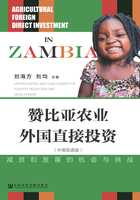
FOREWORD
In many developing countries, the majority of the poorest people live in rural areas, and depend on agriculture for their livelihoods. In this regard, investment in the agricultural sector of these countries can present significant opportunities for development and poverty eradication. As such, it is a common element in the discussions and discourse of policy makers in the developing world.
Admittedly, the global foreign investment which goes to the sector of agriculture is less than one percent of the total investment in all sectors. Most of this international investment in agriculture, however, is going to developing countries. Additionally, some contend that such foreign investment in developing countries' agricultural sector will increase, with the forces driving that trend including a growing demand for food and meat from emerging economies, increases in bio-fuel initiatives, efforts to meet energy security needs, depletion of natural resources(especially land and water)in other countries, volatile food prices, and agricultural commodity speculation.
As an organisation dedicated to combating poverty, Oxfam Hong Kong is particularly concerned about the potentially transformative impacts of investment on the lives and livelihoods of people tied to and dependent upon the agricultural sector. Through the work of our partner organisations, we have seen that foreign investment could play a positive role in agricultural development and poverty reduction and bring a range of benefits to poor farmers and local communities, including earnings increases, technology transfer, higher productivity, market access and job creation. However, experience has also shown that such investment carries the risk of forced evic tions, depriving local communities of their land, increasing conflicts over land and water, distorting customary land tenure systems, compounding local governance issues, reducing the policy space for peasant-oriented agricultural policies and distorting markets towards increasingly concentrated agribusiness interests and trade.
To better understand the poverty impacts of foreign investment in agriculture, Oxfam Hong Kong decided to support a series of research on the investment in a number of developing countries both in Asia and Africa in 2012, in collaboration with other Oxfam affiliates and country teams. This book contains the two research reports of the series about Zambia, where its agricultural sector provides livelihoods to more than half of the population.
In the first part of the book, Dr. Jessica Chu of the School of Oriental and African Studies of the University of London provides an overview of the key trends and policies in the agricultural foreign direct investment in Zambia. In the second part, Professor Aparajita Biswas of the University of Mumbai focuses on the Indian agricultural investment in Zambia and examines its nature and sustainability. To undertake the research, both authors conducted extensive literature review, stakeholders mapping and power analysis. They also made field visits, interviewing a wide range of stakeholders including government officials, investing companies, academics and NGOs, with the support of Africa's experts such as Professor Haifang Liu of the Peking University, and Professor Ajay Dubey of the Jawaharlal Nehru University, as well as Oxfam staff from India, South Africa, the United Kingdom and Zambia.
We hope that the analysis and recommendations presented here will foster thoughtful debate and discussion about the role of agricultural foreign investment as a vehicle for poverty eradication and economic development in developing countries, especially in Zambia, and also lead to strong policies and sustained actions which make the investment an effective force in lifting people out of poverty and deprivation.
Oxfam Hong Kong thanks all partners and staff who contributed their expertise to the research in Zambia. We also extend very special thanks to the support of Profes sor Haifang Liu, who made possible the publication of the book in China and also in both English and Chinese.
Kevin May
Programme and Research Manager
Oxfam Hong Kong, Beijing
December 2016